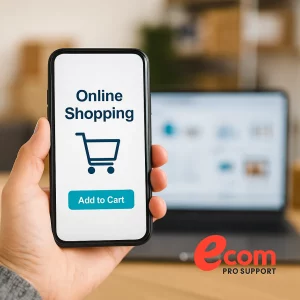Amazon FBA vs Shopify — Which eCommerce Model Wins in 2025?

If you’re ready to start an online business in 2025, you’ve likely narrowed your options down to Amazon FBA and Shopify. Both platforms can lead to big success — but the paths are wildly different.
So how do they compare? Which one’s better for your goals?
Let’s dive into a side-by-side breakdown of Amazon FBA vs Shopify — covering how they work, what they cost, and who they’re best for.
What is Amazon FBA?
Amazon FBA (Fulfillment by Amazon) allows you to:
- Sell products on Amazon’s marketplace
- Store inventory in Amazon’s warehouse
- Let Amazon handle picking, packing, shipping, and returns
You gain access to Amazon’s traffic and Prime customers, but also play by Amazon’s rules and fees.
What is Shopify?
Shopify is an eCommerce platform that allows you to:
- Create your own online store
- Customize design and branding
- Sell on your own website, plus social and sales channels
You get full control, but you’ll need to drive your own traffic and manage fulfillment (or use a 3PL or print-on-demand service).
Amazon FBA vs Shopify — Key Differences
| Feature | Amazon FBA | Shopify |
| Platform | Amazon Marketplace | Your own branded store |
| Inventory Required | Yes | Optional (POD, dropshipping, 3PL) |
| Startup Cost | Medium to High | Low to Medium |
| Fulfillment | Amazon handles logistics | You manage (or use 3rd party) |
| Branding | Limited control | Full control |
| Traffic | Built-in (Amazon shoppers) | Must drive your own |
| Profit Margin | Lower (due to Amazon fees) | Potentially higher margins |
| Customization | Minimal (Amazon listings only) | Full design and feature control |
| Scalability | High (with inventory investment) | High (with marketing budget) |
| Customer Ownership | Amazon owns customer data | You own and control customer data |
Pros and Cons of Amazon FBA
Pros:
- Fast shipping with Prime
- Trust from millions of Amazon shoppers
- Amazon handles customer service and returns
- Easy to scale once you find a winning product
Cons:
- Limited brand identity
- High seller fees
- Amazon can suspend your account anytime
- Intense competition
Pros and Cons of Shopify
Pros:
- Full control over your brand and website
- Higher profit margins
- Direct customer relationships
- Integrates with dropshipping, POD, and other tools
Cons:
- You must drive traffic (ads, SEO, social)
- Need to handle or outsource fulfillment
- Requires more effort to build trust and visibility
Which is Better in 2025 — Amazon FBA or Shopify?
Choose Amazon FBA if you:
- You want instant access to a large marketplace
- You’re okay with giving up some control for convenience
- You have capital to invest in inventory
- You want a fast launch with built-in traffic
Recommended Tools:
- Jungle Scout – Product research
- Helium 10 – Listing optimization and keyword research
Choose Shopify if you:
- You want to build a long-term brand
- You prefer full creative and business control
- You’re good at marketing or have a team for it
- You want to avoid platform dependency
Popular Shopify apps to supercharge your store:
Realistic Costs Comparison
| Expense | Amazon FBA | Shopify |
| Platform fee | $39.99/month (Pro plan) | $29–$79/month |
| Product sourcing | $1,000–$5,000+ | Optional (varies by model) |
| Branding & design | Limited (Amazon rules) | $200–$1,000+ |
| Fulfillment fees | Per-unit + storage fees | Depends on method (3PL, POD) |
| Marketing | Minimal at first | Required (ads, SEO, email) |
Can You Use Both?
Yes — many successful eCommerce brands start on Shopify and expand to Amazon FBA, or vice versa.
- Use Shopify to build your brand and customer list
- Use Amazon FBA to scale with Prime traffic
- Use both to reach customers wherever they shop
You get full control, but you’ll need to drive your own traffic and manage fulfillment (or use a 3PL or print-on-demand service).
Final Verdict: Shopify vs Amazon FBA
here’s no one-size-fits-all answer.
- If you want speed, ease, and built-in buyers → Go with Amazon FBA
- If you want control, branding, and long-term value → Go with Shopify
- If you’re serious → Combine both for the best of both worlds
Not sure where to start — Amazon or Shopify?
Let Ecom Pro Support Ltd guide you — from product research to full store setup.
Let’s Talk – Free Strategy Call
About the Author
Muhammad Hamid Nazir
Co-Founder & CTO, Ecom Pro Support Ltd
With over a decade of experience in business intelligence, data automation, and cloud solutions, Hamid helps brands and agencies unlock powerful insights through customized dashboards and real-time analytics tools.



